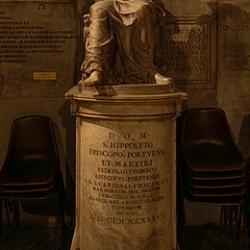. . . Persevering in Faith, with Hope
* * * * *
Why? Why do you feel you have to know about every person’s destiny? We can’t know that. Even John Calvin held that no one could know for sure if someone else was in the elect or even (absolutely) if they themselves were. But we can believe and know that God is both just and merciful, and that every person will end up where they deserve to be.
We do know that we have to believe that Jesus died for us, and wholeheartedly serve Him as our Lord and Savior and Redeemer: as a disciple. Then I think we need to figure out where this Church that He founded exists, if it exists at all. If it does, it is also central to salvation, because the Church is, after all, the Body of Christ.Even though we have settled the outside the church and those who never hear issue – where does that bring us? Would it be safe to say that although we cannot know whether a soul goes to hell or heaven after death
Or purgatory . . .
– the best place to be to ensure the best chance of the soul going to heaven would be in the Roman Catholic Church participating in the life of the church and all its fullness?
Exactly. That is the fullness of both God’s truth and the means of grace, to attain salvation: primarily through the sacraments. But it’s not merely mechanical or automatic. One has to not be in a state of mortal sin, and in good graces with God, following Him with their whole heart. That’s why we Catholics are big on examination of conscience and confession.
So if we cannot know where someone – even ourselves – is going after death and all we can know is that this “Church” can carry us along salvifically via the sacraments if we are in good standing with God – what joy does this bring a faithful person? It seems to me that in the RCC there is this process – e.g. the sacraments – that helps the faithful along the salvation process. Do the faithful ever know if they have gone through the process enough in order to have peace re: where their soul is going?
We can be as certain of our salvation as we are about anything else of which we have knowledge. But because we are creatures, we cannot have absolute certainty about any knowledge. We can have 99.9999 percent certainty, but we cannot have 100 percent, because absolute knowledge about anything is reserved to God. Still, it’s clear that our “near certainty” is pretty reliable. In other words, we do know what we know, including what we know about our own salvation. In Catholic theology, we call this knowledge “moral certainty,” as opposed to God’s “absolute certainty.” On the other hand, our relationship with God is based not on humanly acquired knowledge, but on faith. Why? Because God transcends the realm and capabilities of human knowledge. Our finite minds cannot grasp the infinite, and our finite experience cannot transcend the universe that is its context. We know the unseen, even what comes from revelation, by the things that are seen. This is why God became incarnate, is it not? John 20:29; Romans 1:20; Colossians 1:15; Hebrews 11:1; 1 John 4:20. How, then, do we know God best? Through our loving relationship with him. The knowledge of love plumbs the depths of infinity much more securely than intellectual knowledge. We see this loving relationship at work on the human level in our matrimonial bond.
My point is that there is a difference between faith and humanly acquired knowledge, and Christianity is a divinely revealed religion which requires faith. Faith is not deduced from prior knowledge or from our observation of phenomena, but comes from God’s self-revelation.
I was thinking about this today. Could we use a percentage example to describe one’s chances of salvation based on RC standards – e.g. In the Roman Catholic Church, baptized and confirmed, goes to mass every Sunday, confession every Saturday, and participates in the sacramental life of the church regularly – 98% Protestant baptized and confirmed, goes to a Protestant church every Sunday, reads the Bible regularly – 54% God-fearing Muslim going to the mosque regularly – 6.2% Also…….as I still consider this topic – if I become Roman Catholic, based on the RC’s understanding of theological justification, I would not know if my soul was going to heaven. With lack of this knowledge – I would begin participating in the sacramental life of the Church – a system designed to help me along the way of salvation as I continue to ponder where my soul will be after my death. I sin along the way – but I am uncertain if I have venally sinned or mortally sinned – so I dash off to confession so that I can have my soul cleansed – only after – of course – doing some sort of penance – i.e. saying 10 Hail Mary’s hoping that my penance was enough to cleanse my soul of its former sins. Is that how it works – basically? I forget a lot from my childhood as a Roman Catholic – pardon me. If this is in fact how it works – a cycle without any end until death – I ask again where is the hope – the peace – the love?
Now we’re getting back to unhelpful legalistic discussion again. The Catholic faith, or Christian faith generally speaking, is not about legalism and obsessive bondage but about faith, hope, and love; about a relationship with God and with our fellow man, and faith that God has provided His children with an authoritative teaching Church, so that they don’t have to spend their entire lives in an abstract search for all theological truth, never achieving it (because who has that amount of time or knowledge to figure everything out, anyway?). The true apostolic tradition has been received and delivered to each generation, through the Church, by the guidance of God the Holy Spirit.*
I didn’t mean to imply at all that we are out to sea without any hope or joy, because we’re not absolutely certain of our salvation. God wants us to be vigilant and to persevere. This is a good thing, not a bad thing, because human beings tend to take things for granted and to become complacent. Unfortunately, much of the Protestant theology of salvation (soteriology) caters to this human weakness, and is too simplistic (and too unbiblical).*
I wholeheartedly agree with David: the degree of moral assurance we can have is very high. The point is to examine ourselves to see if we are mired in serious sin, and to repent of it. If we do that, and know that we are not subjectively guilty of mortal sin, and relatively free from venial sin, then we can have a joyful assurance that we are on the right road.*
I always use my own example, by noting that when I was an evangelical, I felt very assured of salvation, though I also believed (as an Arminian) that one could fall away if one rejected Jesus outright. Now as a Catholic I feel hardly any different than I did as an evangelical. I don’t worry about salvation. I assume that I will go to heaven one day, if I keep serving God. I trust in God’s mercy, and know that if I fall into deep sin, His grace will cause me to repent of it (and I will go along in my own free will) so that I can be restored to a relationship with Him.*
We observe St. Paul being very confident and not prone to lack of trust in God at all. He had a robust faith and confidence, yet he still had a sense of the need to persevere and to be vigilant. He didn’t write as if it were a done deal: that he got “saved” one night in Damascus and signed on the dotted line, made an altar call and gave his life to Jesus, saying the sinner’s prayer or reciting John 3:16. No. This is what Paul wrote:
*
1 Corinthians 9:27 (RSV) but I pommel my body and subdue it, lest after preaching to others I myself should be disqualified.
1 Corinthians 10:12 Therefore let any one who thinks that he stands take heed lest he fall.
Galatians 5:1, 4 . . . stand fast therefore, and do not submit again to a yoke of slavery . . . You are severed from Christ, you who would be justified by the law; you have fallen away from grace.
Philippians 3:11-14 that if possible I may attain the resurrection from the dead. Not that I have already obtained this or am already perfect; but I press on to make it my own, because Christ Jesus has made me his own. Brethren, I do not consider that I have made it my own . . . I press on toward the goal for the prize of the upward call of God in Christ Jesus.
1 Timothy 4:1 Now the Spirit expressly says that in later times some will depart from the faith by giving heed to deceitful spirits and doctrines of demons.
1 Timothy 5:15 For some have already strayed after Satan.
*So we see yet again, that the biblical record gives us what is precisely the Catholic position: neither the supposed “absolute assurance” of the evangelical Protestant, nor the manic, legalistic, Pharisaical, mechanical caricature of what outsider, non-experienced critics of Catholicism think Catholicism is, where a person lives a “righteous” life for 70 years, then falls into lust for three seconds, gets hit by a car, and goes to hell (as if either Catholic teaching or God operate in that infantile fashion).
*
The truth of the matter is that one can have a very high degree of moral assurance, and trust in God’s mercy. St. Paul shows this. He doesn’t appear worried at all about his salvation, but on the other hand, he doesn’t make out that he is absolutely assured of it and has no need of persevering. He can’t “coast.” The only thing a Catholic must absolutely avoid in order to not be damned is a subjective commission of mortal sin that is unrepented of. The mortal / venial sin distinction is itself explicitly biblical. All this stuff is eminently biblical. That’s where we got it!*
Moreover, the reason we are so concerned about falling into mortal sin and being damned, is because St. Paul in particular states again and again that those who are characterized by and wholly given over to certain sinful behaviors will not be saved in the end:*
1 Corinthians 6:9-11 Do you not know that the unrighteous will not inherit the kingdom of God? Do not be deceived; neither the immoral, nor idolaters, nor adulterers, nor sexual perverts, nor thieves, nor the greedy, nor drunkards, nor revilers, nor robbers will inherit the kingdom of God. And such were some of you. But you were washed, you were sanctified, you were justified in the name of the Lord Jesus Christ and in the Spirit of our God.
[note baptismal regeneration: “washed” and the implication that sanctification and justification are united, unlike Protestantism, which formally separates them, and makes sanctification not directly tied to salvation]
Galatians 5:19-21 Now the works of the flesh are plain: fornication, impurity, licentiousness, idolatry, sorcery, enmity, strife, jealousy, anger, selfishness, dissension, party spirit, envy, drunkenness, carousing, and the like. I warn you, as I warned you before, that those who do such things shall not inherit the kingdom of God.
Ephesians 5:3-6 But fornication and all impurity or covetousness must not even be named among you, as is fitting among saints. Let there be no filthiness, nor silly talk, nor levity, which are not fitting; but instead let there be thanksgiving. Be sure of this, that no fornicator or impure man, or one who is covetous (that is, an idolater), has any inheritance in the kingdom of Christ and of God. Let no one deceive you with empty words, for it is because of these things that the wrath of God comes upon the sons of disobedience. (cf. 1 Tim 1:9-10)
Revelation 21:8 But as for the cowardly, the faithless, the polluted, as for murderers, fornicators, sorcerers, idolaters, and all liars, their lot shall be in the lake that burns with fire and sulphur, which is the second death.
Revelation 22:15 Outside are the dogs and sorcerers and fornicators and murderers and idolaters, and every one who loves and practices falsehood.
Romans 5:1-5 Therefore, since we are justified by faith, we have peace with God through our Lord Jesus Christ. Through him we have obtained access to this grace in which we stand, and we rejoice in our hope of sharing the glory of God. More than that, we rejoice in our sufferings, knowing that suffering produces endurance, and endurance produces character, and character produces hope, and hope does not disappoint us, because God’s love has been poured into our hearts through the Holy Spirit which has been given to us.
Romans 8:16-17 it is the Spirit himself bearing witness with our spirit that we are children of God, and if children, then heirs, heirs of God and fellow heirs with Christ, provided we suffer with him in order that we may also be glorified with him.
Romans 12:12 Rejoice in your hope, be patient in tribulation, be constant in prayer.
Romans 15:4 For whatever was written in former days was written for our instruction, that by steadfastness and by the encouragement of the scriptures we might have hope.
Romans 15:13 May the God of hope fill you with all joy and peace in believing, so that by the power of the Holy Spirit you may abound in hope.
Galatians 5:5-6 For through the Spirit, by faith, we wait for the hope of righteousness. For in Christ Jesus neither circumcision nor uncircumcision is of any avail, but faith working through love.
Ephesians 1:9-14, 18 For he has made known to us in all wisdom and insight the mystery of his will, according to his purpose which he set forth in Christ as a plan for the fulness of time, to unite all things in him, things in heaven and things on earth. In him, according to the purpose of him who accomplishes all things according to the counsel of his will, we who first hoped in Christ have been destined and appointed to live for the praise of his glory. In him you also, who have heard the word of truth, the gospel of your salvation, and have believed in him, were sealed with the promised Holy Spirit, which is the guarantee of our inheritance until we acquire possession of it, to the praise of his glory. . . . having the eyes of your hearts enlightened, that you may know what is the hope to which he has called you, what are the riches of his glorious inheritance in the saints,
Colossians 1:11-14 May you be strengthened with all power, according to his glorious might, for all endurance and patience with joy, giving thanks to the Father, who has qualified us to share in the inheritance of the saints in light. He has delivered us from the dominion of darkness and transferred us to the kingdom of his beloved Son, in whom we have redemption, the forgiveness of sins.
Colossians 1:21-24 And you, who once were estranged and hostile in mind, doing evil deeds, he has now reconciled in his body of flesh by his death, in order to present you holy and blameless and irreproachable before him, provided that you continue in the faith, stable and steadfast, not shifting from the hope of the gospel which you heard, which has been preached to every creature under heaven, and of which I, Paul, became a minister. Now I rejoice in my sufferings for your sake, and in my flesh I complete what is lacking in Christ’s afflictions for the sake of his body, that is, the church,
Colossians 3:24 knowing that from the Lord you will receive the inheritance as your reward; you are serving the Lord Christ.
Hebrews 6:10-12 For God is not so unjust as to overlook your work and the love which you showed for his sake in serving the saints, as you still do. And we desire each one of you to show the same earnestness in realizing the full assurance of hope until the end, so that you may not be sluggish, but imitators of those who through faith and patience inherit the promises.
Hebrews 10:22-24 let us draw near with a true heart in full assurance of faith, with our hearts sprinkled clean from an evil conscience and our bodies washed with pure water. Let us hold fast the confession of our hope without wavering, for he who promised is faithful; and let us consider how to stir up one another to love and good works,
1 Peter 1:3-7 Blessed be the God and Father of our Lord Jesus Christ! By his great mercy we have been born anew to a living hope through the resurrection of Jesus Christ from the dead, and to an inheritance which is imperishable, undefiled, and unfading, kept in heaven for you, who by God’s power are guarded through faith for a salvation ready to be revealed in the last time. In this you rejoice, though now for a little while you may have to suffer various trials, so that the genuineness of your faith, more precious than gold which though perishable is tested by fire, may redound to praise and glory and honor at the revelation of Jesus Christ.
Stay in touch! Like Biblical Evidence for Catholicism on Facebook:


















